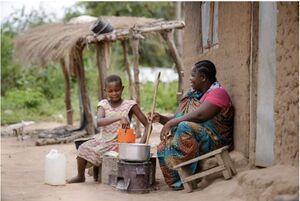Humanitarian Energy Situation in Uganda
Humanitarian Situation Background
Uganda is one of the largest refugee hosting countries worldwide, with approximately 1.5 million refugees, mainly from South Sudan, the Democratic Republic of Congo (DRC), Rwanda, Somalia, and Burundi. Despite the substantial number of refugees, Uganda provides refugees with land, freedom of movement, equal access to social services and the right to work and set up businesses. But the lack of quality energy products and services for cooking and lighting, communication (phone charging), and productive use limits opportunities to meet basic needs, ensure protection, and strive for self-reliance. And limited income generating opportunities restrict ability to acquire energy solutions. On the other hand, limited access to affordable energy options is a barrier to employment creation, business opportunities, innovation, and market development and thus to economic development.Uganda is applying an integrated approach, whereby refugees are included into the national planning framework and national statistics. By doing so, Uganda closely follows the paradigm of the Global Compact on Refugees (GCR), the adoption of the New York Declaration and its Comprehensive Refugee Response Framework (CRRF) and especially focuses on:
- Easing the pressures on host countries
- Enhancing refugee self-reliance
Uganda’s progressive refugee policy, predating the GCR, welcomed large numbers of displaced persons. This has led to the establishment of parallel systems, which addressed the needs of refugees and host communities separately through humanitarian partners’ services and local government services.
The influx of refugees has placed overwhelming demands on already strained capacities and resources of the government, the host communities, and the environment. Lack of access to sustainable energy to have light in homes, charge phones, or to power machines for agricultural activities is one of the great challenges that Uganda faces these days, in both host as well as refugee communities. Households, small and medium-sized enterprises (SMEs) and social institutions like schools and health centres often have very limited access to energy and are not able to cover essential needs. Moreover, electricity infrastructure in refugee and host communities is minimal and usually generated through expensive and environmentally harmful fossil fuels. The majority of residents cook on open fires using firewood, which is becoming increasingly more scarce. This forces people, mostly women and girls, to leave the protected area of the settlement and to walk long distances to collect firewood, exposing them to assault. In addition, air pollution from cooking over open fires in poorly ventilated spaces can cause serious health issues. Humanitarian agencies sometimes give out free solar lanterns or improved cookstoves. But the quality of the lanterns is often lacking, making them break quickly and rendering them obsolete. As for the stoves, they do not always match people’s cooking habits and preferences, and also end up not being used. Some higher quality energy products are available for sale in the settlements, but many people cannot afford them.
Ressources
- The State of Sustainable Household Energy Access in Refugee Settings in Uganda: Survey Findings in Rhino Camp Settlement and Imvepi Settlement, Arua District, West Nile Region (EnDev 2019)
- The Uganda Energy Kiosk Model in Refugee Settings
- Creating Energy Solutions in Rhino Camp
- How co -creation with communities lead to more sustainable energy access
- Providing Access to Energy in Displacement Settings: Experiences from Ofua Village, Rhino Camp Refugee Settlement
- End-User Finance and Payment Systems in Displacement Settings in Uganda
- The Sustainable Energy Response Plan (SERP) for Refugees and Host Communities in Uganda
- Electrification of Six Health Centres in Rhino Camp and Imvepi Refugee Settlements - energypedia




















